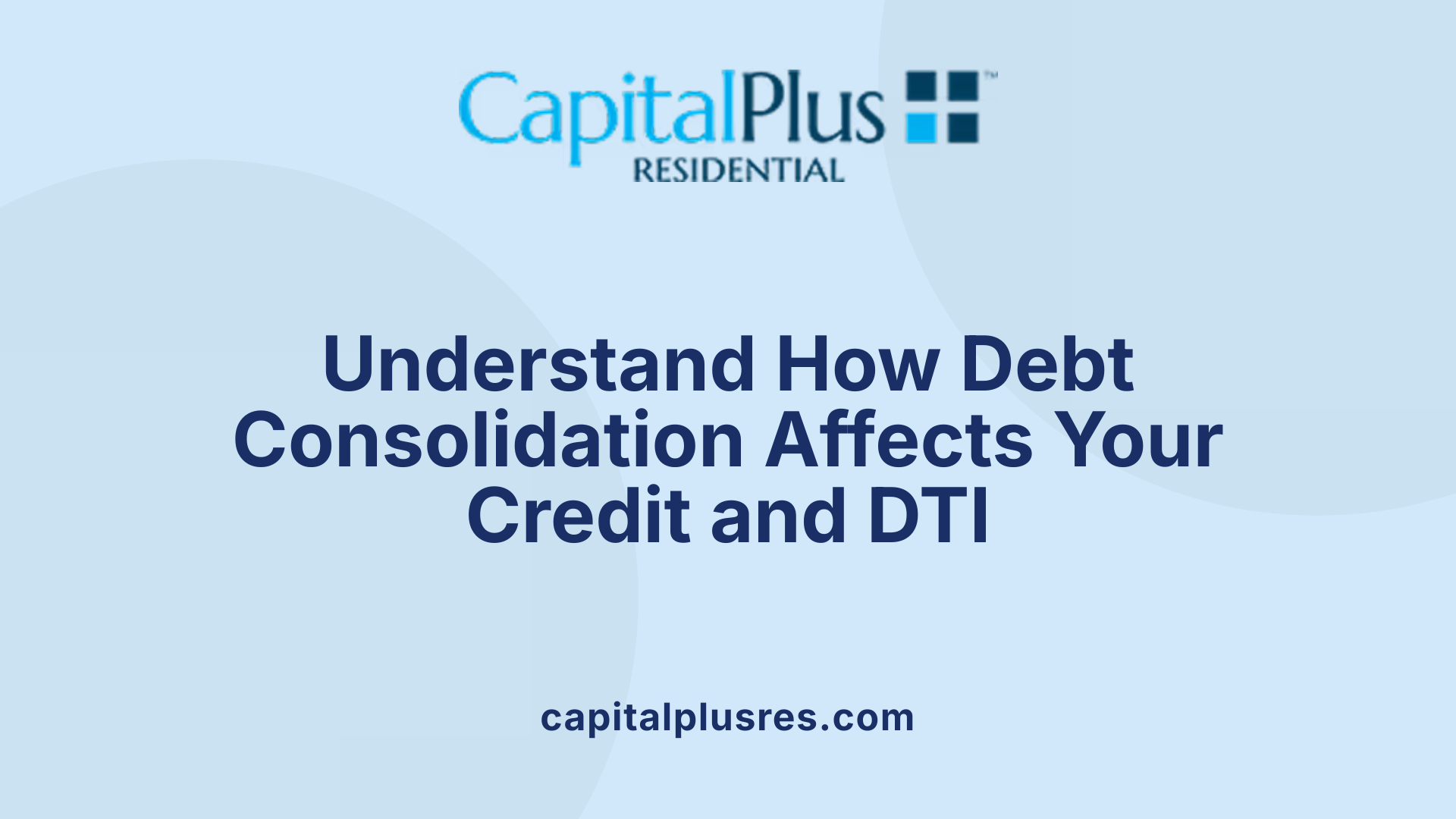Exploring the Intersection of Debt Consolidation and Mortgage Readiness
Understanding whether to consolidate your debt before applying for a mortgage is a critical financial decision. This process involves merging various debts into a single payment and may impact mortgage qualification, costs, and long-term financial health. This article breaks down the essential factors and offers insight to help potential homebuyers make informed choices.
What Is Debt Consolidation and How Does It Relate to Mortgages?
What does debt consolidation involve?
Debt consolidation is the process of merging multiple debts into a single account, simplifying repayment by combining various balances like credit cards, personal loans, and payday loans into one monthly payment. Often, this involves rolling high-interest unsecured debts, especially credit card balances, into a new or existing mortgage.
How is home equity used in consolidating debt?
When consolidating debt through a mortgage, homeowners tap into their home equity—the difference between the home's current market value and the amount owed on the mortgage. This equity acts as collateral that enables the homeowner to borrow funds to pay off other debts. Essentially, it transforms unsecured debts into secured ones by linking them to the property.
The process of consolidating debts into a mortgage
Consolidation via mortgage means increasing the total mortgage balance to include outstanding debts. While this can lower interest rates and reduce the number of payments, it also means lengthening the repayment period and possibly incurring additional costs like breaking an old mortgage or legal fees. Hence, it's important to weigh the benefits of lower interest and simplified payments against the risks of longer debt duration and higher mortgage obligations.
Advantages of Consolidating Debt Before Getting a Mortgage

What are the benefits of consolidating debt when preparing to get a mortgage?
Consolidating debt offers several advantages for those preparing to apply for a mortgage. By combining multiple debts into a single payment, homeowners can often secure lower interest rates, especially when rolling high-interest debts like credit card balances into a mortgage. This simplification of payments helps in managing finances more efficiently, reducing the risk of missed or late payments.
How does debt consolidation affect credit scores and mortgage terms?
Debt consolidation can positively impact your credit score by streamlining outstanding balances and enabling timely payments. An improved credit score enhances your eligibility for favorable mortgage interest rates and terms. Additionally, consolidating debt may improve your debt-to-income (DTI) ratio, which mortgage lenders heavily consider during evaluation. Ideally, aiming for a DTI ratio below 43%, and preferably under 35%, increases the likelihood of mortgage approval.
By lowering interest rates and simplifying payments, debt consolidation can make managing financial obligations easier and boost your mortgage prospects. However, it's important to weigh the longer repayment period that might come with consolidation, as this can extend the duration of your debt.
Potential Drawbacks and Costs Associated with Debt Consolidation into a Mortgage
What are the potential downsides of consolidating debt into a mortgage?
Debt consolidation by rolling various debts into a mortgage can seem attractive, but it comes with notable drawbacks. One major concern is the increase in the total mortgage debt. Since high-interest debts like credit card balances are added to the mortgage balance, borrowers end up owing more on their home loan than before.
This increase in mortgage amount often leads to higher overall costs. For example, there might be fees involved in breaking an existing mortgage, as well as potential legal charges tied to the consolidation process. These expenses can add up, negating some of the financial relief expected from consolidating.
Another important downside is the extension of the repayment period. While monthly payments might be lower due to spreading the debt over a longer term, the total time to clear the debt lengthens. This longer debt duration can mean paying more interest overall and staying in debt longer than initially planned.
Understanding these potential costs and risks is crucial before deciding on mortgage consolidation. Borrowers should weigh the benefits of lowered interest rates and simpler payments against the increased debt amount, added fees, and longer repayment timelines to make informed financial choices.
How Mortgage Lenders Evaluate Debt Consolidation Proposals
What financial ratios do mortgage lenders consider when approving debt consolidation?
Mortgage lenders focus on several critical financial ratios when assessing debt consolidation plans. The most important among these are the loan-to-value (LTV) ratio, the debt-to-income (DTI) ratio, and the amount of available home equity.
Loan-to-Value (LTV) Ratio
The LTV ratio measures the balance of your mortgage debt compared to your home’s appraised value. A lower LTV suggests more equity and less risk for the lender. When consolidating debt into your mortgage, this ratio often increases since you are adding more debt to your home loan.
Debt-to-Income (DTI) Ratio
The DTI ratio calculates your monthly debt payments against your gross monthly income. Lenders typically prefer a DTI below 43%, with an ideal target below 35%. Maintaining a favorable DTI is crucial for approval because it indicates your ability to manage and repay monthly obligations comfortably.
Home Equity Considerations
Home equity— the difference between your home’s market value and what you owe — is central to consolidation. Using equity can lower interest rates on unsecured debts by rolling them into your mortgage, but it also increases your mortgage balance and overall exposure.
Mortgage Approval Process
During approval, lenders review these ratios alongside your credit score and overall financial profile. While consolidating debt may improve your credit score and simplify payments, it can also mean longer repayment terms and added costs such as legal fees or penalties for breaking an existing mortgage.
Understanding these factors helps borrowers plan effectively and increases chances of gaining lender approval for debt consolidation through mortgage refinancing or similar programs.
Which Types of Debt Benefit Most from Consolidation into a Mortgage?

What types of debts are most suitable for consolidation through a mortgage?
Debt consolidation through a mortgage is particularly advantageous for high-interest unsecured debts. These include credit card balances, personal loans, and payday loans. Such debts usually carry higher interest rates compared to mortgages, making them costly to maintain individually.
By rolling these debts into a single mortgage payment, borrowers can benefit from lower interest rates typical of mortgage lending. This not only reduces the total interest paid but also simplifies payments by replacing multiple bills with one monthly payment.
Credit card balances are often the largest contributors to high-interest debt portfolios, and consolidating these can significantly improve financial stability. Similarly, personal loans taken for assorted expenses and payday loans with their steep interest rates also qualify for consolidation benefits.
Consolidation into a mortgage leverages your home equity, which is the difference between your home's current market value and your existing mortgage balance. This option can be a smart financial move if managed carefully, though one should be aware of potential risks, such as increased total mortgage debt and the implications of longer repayment terms.
Ultimately, the best candidates for consolidation through a mortgage are those who hold several high-interest unsecured debts and have sufficient home equity. Consulting with financial advisors can help determine if this strategy aligns with your financial goals and mortgage eligibility.
Alternative Debt Consolidation Options Outside of Mortgages
What are alternatives to consolidating debt into a mortgage?
When considering ways to manage multiple debts, homeowners can explore options beyond rolling debt into their mortgage. Three common alternatives include home equity lines of credit (HELOC), debt consolidation loans, and debt settlement programs, each offering distinct advantages and challenges.
Home Equity Lines of Credit (HELOC)
A HELOC allows homeowners to borrow against the equity in their home, similar to a credit card with a flexible borrowing limit. It typically has lower interest rates than unsecured debts, making it an appealing choice for consolidation. However, as a revolving line of credit secured by your home, missed payments can put your property at risk.
Debt Consolidation Loans
These are personal loans used to pay off multiple debts, combining them into a single monthly payment usually with a fixed interest rate and term. They simplify payments and often lower interest compared to credit cards. Borrowers should note that longer repayment terms can reduce monthly payments but may increase total interest paid and affect debt-to-income ratios.
Debt Settlement Programs
Debt settlement involves negotiating with creditors to reduce the amount owed, potentially lowering debt balances faster. While it can offer relief for those struggling to meet payments, it may negatively impact credit scores and involves fees. It’s important to approach such programs cautiously and consider professional advice.
Weighing the Pros and Cons
Choosing between these alternatives depends on individual financial situations. HELOCs provide flexibility but risk home loss if payments lapse. Consolidation loans simplify debt management but may extend debt duration and influence credit metrics. Debt settlement may reduce debts but can damage credit and involve costs.
Consulting a financial advisor or credit counselor can help evaluate these options and determine which approach aligns with your financial goals and circumstances.
The Role of Financial Advisors and Credit Counselors in Debt Consolidation Decisions

How can financial advisors assist with debt consolidation decisions before applying for a mortgage?
Financial advisors and credit counselors play a crucial role in guiding individuals through the complex process of debt consolidation, especially when it involves rolling debts into a mortgage. They begin by evaluating your entire financial situation, including income, existing debt, home equity, credit score, and monthly expenses. This comprehensive review helps determine whether consolidating debt into your mortgage is a viable and beneficial option.
Evaluation of individual financial circumstances
These professionals analyze your specific financial circumstances such as your debt-to-income ratio, loan-to-value ratio, and credit profile. By understanding these factors, they can forecast how consolidation might affect your mortgage approval prospects and long-term finances. This step is essential to avoid extending your debt burden with unfavorable terms.
Eligibility assessment
Advisors assess your eligibility for consolidation by looking at home equity availability and current mortgage terms. They can advise whether alternatives like a Home Equity Line of Credit (HELOC) or a debt consolidation loan may be more suitable if the mortgage option is less favorable.
Long-term implications of consolidation
A significant part of their guidance includes explaining the long-term effects of debt consolidation. They help you understand potential increased mortgage payments, extended payoff periods, legal fees, and how consolidating might impact your credit score and debt-to-income ratio over time. This foresight aids in making an informed decision that aligns with your financial goals.
Ultimately, financial advisors and credit counselors offer personalized strategies and objective advice, helping you weigh the pros and cons and choose the best path toward financial stability and successful mortgage application.
Impact of Debt Consolidation on Credit Score and Debt-to-Income Ratio

How does consolidating debt affect your credit score?
When you apply for a debt consolidation loan, lenders perform a hard inquiry on your credit report. This inquiry can cause a temporary dip in your credit score. However, this decline is usually short-lived. By making timely and consistent payments on your consolidation loan, you can recover your credit score and even see improvements over time.
What is a temporary credit dip, and why does it happen?
A temporary credit dip occurs after a hard inquiry made by lenders during your loan application. This is a normal part of the lending process and signals that you are seeking new credit. While this can lower your score slightly, responsible repayment behavior soon after helps stabilize and raise your credit rating.
How important is the debt-to-income (DTI) ratio for mortgage approval?
The debt-to-income ratio is a crucial factor when applying for a mortgage, especially after consolidating debts. Lenders look for a DTI ratio below 43%, with an ideal target under 35%. A lower DTI indicates better financial health, showing that you can manage monthly debts relative to your income. Improving your DTI through consolidation increases your chances of mortgage approval and better loan terms.
Why aim for a DTI below 43% or ideally below 35%?
A DTI below 43% is generally the upper limit for many lenders, ensuring debt obligations are manageable. Keeping your DTI ideally below 35% places you in a strong position, reflecting good financial discipline and improving your eligibility for favorable mortgage rates and terms.
Efficiently managing the impact of debt consolidation on your credit score and DTI ratio can significantly influence your mortgage approval prospects and overall financial health.
Balancing Repayment Terms: Short-Term Relief vs Long-Term Costs
What are the risks of longer repayment terms with consolidation loans?
Consolidation loans often come with the appeal of lower monthly payments, as extending the repayment period spreads out the debt over a longer time frame. This can provide essential short-term financial relief by making monthly budgeting more manageable.
However, longer repayment periods typically result in increased total interest costs, meaning you end up paying more over the life of the loan. This rise in overall debt can strain your finances in the long run.
Additionally, extending the repayment period affects your debt-to-income (DTI) ratio. A higher DTI ratio can hurt your chances of mortgage approval, as lenders prefer borrowers with a DTI ideally below 35%, and rarely above 43%. The increased monthly debt obligations may push your DTI beyond these thresholds, undermining your mortgage eligibility.
Balancing the benefit of lower monthly payments with the potential negative impact on total debt and DTI ratio is crucial when considering debt consolidation through longer repayment terms.
Strategic Steps to Take When Considering Debt Consolidation Before a Mortgage
Assessing total costs and benefits
Before deciding to consolidate debt into a mortgage, it's crucial to evaluate both the advantages and potential downsides. While consolidation can reduce interest rates and simplify payments, it often increases the total mortgage amount. This can lead to higher overall costs due to fees like mortgage penalties and legal expenses. Moreover, extending the repayment period might lower monthly payments but prolongs debt duration, potentially increasing total interest paid.
Considering home equity limits
Using home equity is central to mortgage debt consolidation. Home equity represents the difference between your home's market value and the outstanding mortgage balance. Mortgage lenders scrutinize your loan-to-value (LTV) ratio and home equity to determine your eligibility for consolidation. It’s important to ensure you have sufficient equity without overleveraging your home, as borrowing too much can increase financial risk.
Consulting financial experts
Engaging with financial advisors or credit counselors is an important step in the consolidation process. They can help analyze your unique financial situation, evaluate different consolidation options like home equity lines of credit (HELOC), debt consolidation loans, or debt settlement programs, and assess long-term impacts. Their guidance ensures you understand eligibility criteria and can make informed decisions aligned with your goals.
Timing consolidation with mortgage application
The timing of your debt consolidation can affect mortgage approval. Consolidation may improve your debt-to-income (DTI) ratio and credit score, both key factors for mortgage qualification. However, applying for consolidation loans can cause a temporary credit score dip due to hard inquiries. Planning consolidation efforts to allow time for credit recovery and consistent payment history can enhance chances of securing favorable mortgage terms.
Final Considerations: Is Debt Consolidation the Right Move Before Getting a Mortgage?

Weighing Pros and Cons
Debt consolidation before applying for a mortgage can simplify finances by merging multiple high-interest debts into one payment, often at a lower interest rate. This can lead to improved credit scores and a better debt-to-income (DTI) ratio, both important for mortgage approval. However, consolidation could also extend your repayment period, resulting in longer debt duration and possibly higher total costs. Additionally, consolidating debt into a new mortgage might increase your overall mortgage balance and trigger fees such as breaking the current mortgage or legal expenses.
Long-term Financial Implications
While consolidating debt can lower immediate monthly payments, it may raise your debt-to-income ratio if repayments are extended, which could affect mortgage eligibility. A higher credit score after consolidation might secure better mortgage terms, but the initial process can cause a temporary dip in your credit score due to credit inquiries. It is crucial to consider whether the long-term savings in interest outweigh possible increases in total debt and repayment length.
Importance of Personalized Financial Advice
Given the complexities involved, consulting financial advisors or credit counselors is essential. They can help assess your unique situation, including your home equity, loan-to-value ratio, and types of existing debts. Advisors can also analyze alternative options like home equity lines of credit (HELOC), debt settlement programs, or traditional consolidation loans and identify the most suitable approach based on your financial goals and mortgage plans.
Making an Informed Choice on Debt Consolidation Before Your Mortgage
Deciding whether to consolidate debt before securing a mortgage involves carefully weighing several factors including your financial situation, types of debts, home equity, and lender requirements. While consolidation can streamline payments, improve credit scores, and potentially lead to better mortgage terms, it also carries risks such as increased overall debt and costs. Consulting financial professionals and conducting a thorough assessment of your unique circumstances will empower you to make the best decision for your path to homeownership.









